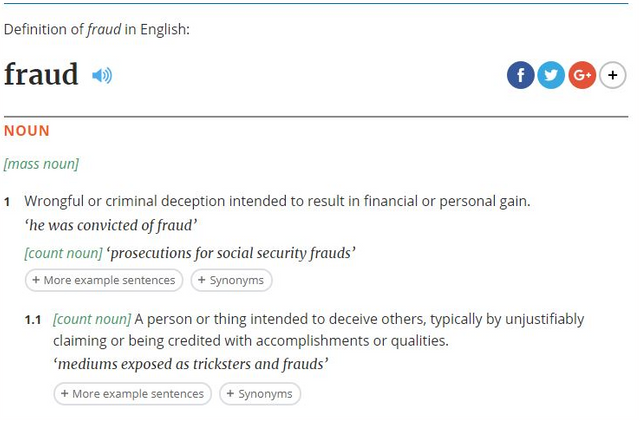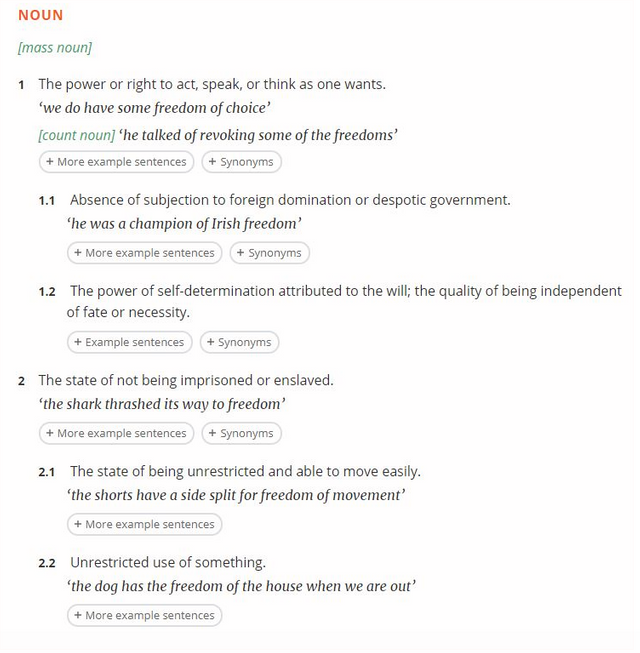Crypto: Fraud or Financial Freedom?
Definition of Fraud
From my experience, this is a question which is on the mind of every potential new investor.
Having spent some time working in the counter-fraud unit for an insurance company, I think the first place we should start is by defining the term ‘fraud’, as it is very easily used incorrectly.
The Oxford English Dictionary defines fraud as:

To analyse the above definition of fraud, one would logically deduce (in very basic terms) that either:
- Someone is tricking a person(s) to receive valuable assets through deception
- Someone or something is trying to take credit for good characteristics “it” doesn’t have
Cryptirony
Let’s look at this very basically in terms of cryptocurrency then.
With reference to point one, the obvious response to the idea that cryptocurrency is “fraud”, is a question.
How can something that is owned by nobody be tricking you or anyone else?
Essentially, putting the terms “cryptocurrency” and “fraud” next to one another is a complete oxymoron. It is irony in its truest form. Does this mean Google is a fraud?
The very meaning of decentralised is that no one person, group or entity can own it; they merely possess it.
Secondly, with reference to point two, another question: How can a cryptocurrency take credit for something when it is an inanimate object? How can “it” claim to be anything when it doesn’t have a mouth, tongue or voice box?
You may have chuckled at that – but this is exactly what is being reported in the mainstream media! As a result, unfortunately, this is what many of the general public believe: “cryptocurrency is fraud”- the masses scream in cohesion.
The Truth
What cannot be denied is that fraud exists in the crypto space. But the fraud being committed is by dishonest people who are exploiting new investors, as well as the vulnerable, in the cryptocurrency and blockchain technologies space.
Cryptocurrency, from a holistic perspective, cannot be blamed for misuse as a result of the crimes committed by people. That would be like blaming modern Germany for the Nazis; or Ireland for the IRA; or England for the British Empire and Boar concentration camps; or the USA for Hiroshima.
It is some of the people who run these entities that commit these atrocities, much like it is some of the people within the crypto community who look to defraud others.
Fraud has its place in crypto, but it is not unique to crypto.
In the UK alone fraud costs the UK economy £193 BILLION A YEAR: More than £6000 a second.
So what is the answer?
The Fight
One way of combating multiple cases of fraud is to educate the masses. Every new investor needs to be educated in the following (as a snapshot):
- The risks involved in trading any asset
- The risks involved in trading cryptocurrencies
- The risks of cyber-crime (hacking)
- The market volatility of cryptocurrency
- How to avoid obvious scams
- Why it is vital to avoid clicking links from unknown entities
- Where to hold your cryptocurrencies securely
This is not an extensive list – but it does outline just how many creative ways which fraudsters can attempt to steal valuable assets. Moreover, as Bitcoin and blockchain technologies are in their infancy, the cryptocurrency space is a fraudsters wet dream. For cryptocurrency to grow the general public requires intervention in this area... And fast. In true Martin Luthor King Jr. fashion: ‘I have a dream’ that the crypto community will rally to educate groups of people, face to face, through community education programmes and lectures.
Financial Freedom
Continuing with the theme of analysing language, the words ‘financial’ and ‘freedom’ actually form a concept, so let’s explore the word ‘freedom’.
Once again, Oxford English Dictionary defines it as:

The above is only a snapshot of further definition from the Oxford English Dictionary, however from the points in the image above; I think a crypto amalgamated checklist is in order:
- “The power or right to act, speak, or think as one wants” – Interaction with cryptocurrency is uncontrollable and only limited to existing architecture and supply.
- “The power of self-determination attributed to the will; the quality of being independent of fate or necessity” – There is a lot to process there, but essentially, cryptocurrency(ies) is/are completely independent of any ownership or possession. The individual owns the private key, which is the only accessible way to facilitate transactions
- “The state of not being imprisoned or enslaved” – Satoshi Nakamoto’s vision for Bitcoin lends itself to enabling people to break the shackles of control governed by central authorities with entities and trusted third parties.
- “The state of being unrestricted and able to move easily” – cryptocurrency (in the holistic sense) cannot be restricted from movement and can be sent anywhere at any time by anyone who has rights to do so. All of the coins are stored on the blockchain and transcend national borders.
- “Unrestricted use of something” – Nobody and nothing can tell you what to do or what not to do with your cryptocurrencies.
Summarising the above, it would seem that it is clear the concept of cryptocurrency is inarguably more aligned with the concept of freedom, as opposed to being defined by the argument that is fraud.
Calling Crypto Fraud Can Be Fraud
Earlier in this article I indicated that it was ironic how the word fraud could be used to describe crypto.
Here, I am going to argue that it is fraudulent to call crypto fraud.
Imagine this scenario:
Bob, a cryptocurrency investor, pays Alice, a writer in the mainstream media, 250$ to write an article claiming cryptocurrency is fraud
Carol, a novice cryptocurrency investor, sells all her cryptocurrency at a deflated value, because she has read Alice’s article
Bob then purchases all of Carol’s cheap cryptocurrency
Carol observes the price of said cryptocurrency rising and re-buys the cryptocurrency
Bob then sells the cryptocurrency he has purchased from Carol at an inflated price back to her
Bob rinses and repeats the cycle
You may feel as though I’m not speaking any sense - but is this really so difficult to believe? We’ve seen instances of this occurring with big players in the game already… Just look at Jamie Dimon and JPM buying up a load of Bitcoin right after his claim Bitcoin was a fraud.
Now, re-read the definition of ‘fraud’ again, paying particular attention to point one. Is this not the definition of fraud? I would argue that it is the exact definition of fraud and it is happening all the time, non-stop.
I repeat - It is not cryptocurrency which is fraudulent; it is the people controlling the media and the cash-flow. The more that they repeat this cycle, the more value they assume, the more control they assume, the more they can create fraudulent scenarios.
I appreciate that much of this article has been word and concept analysis, without any real consensus to scrutinise the ideology of individuals or organisations. But for those of you who can appreciate that all ideologies are rooted in language, whilst the matrix of language is words, perhaps once again it will highlight that the constant barrage of pejorative words and terminology used to describe “cryptocurrency”, are either misguided or misused.
-Author: @Robbeh
Sign the Declaration!
Join us: Twitter | Facebook | Discord | Telegram |

upvote for me please? https://steemit.com/news/@bible.com/2sysip
upvote for me please? https://steemit.com/news/@bible.com/2sysip